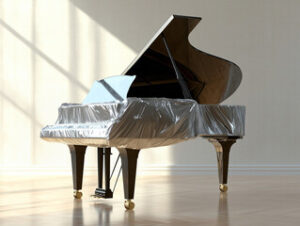Pianos are expensive and beautiful instruments, so keeping them in good condition is important. The right storage space will keep your piano safe and help preserve its value. Contact Piano Storage Denver for professional help.
Most garages lack climate control, and this can damage a piano over time. Fluctuations in temperature and humidity can cause wood to rot, keys to break off, and tuning pins to fall out.
Pianos are not just large, heavy musical instruments – they’re delicate and must be handled with care. That’s why it’s important to choose a storage solution that’s climate controlled. Temperature fluctuations can cause damage to pianos, affecting their sound quality, appearance, and value. In a climate controlled facility, you’ll have peace of mind knowing your precious instrument is in safe hands and will be returned to you in the same condition it was sent to storage in.
Wooden pianos are highly sensitive to changes in temperature and humidity, especially here in Minnesota. Fluctuations in temperature can cause the wood to swell or shrink, which can have devastating effects on your piano’s integrity and structural stability. Additionally, humidity fluctuations can affect the piano’s strings and other metal components. Over time, this can lead to rust or even mold growth.
A reputable piano storage facility will have a team of experts who are dedicated to protecting your delicate instrument during storage. This includes ensuring the piano’s moving parts are properly secured to prevent any shifting or damage during transportation and storage. They will also be sure to wrap each surface in protective materials that shield the instrument from dust and other contaminants. This attention to detail will ensure that your piano emerges from storage in the same pristine condition as it went in, ready to delight audiences with its beautiful sounds.
In addition to a team of professional piano movers, your storage option should provide reinforced flooring and raised platforms to support the weight of your instrument. You’ll also want to find a facility that offers security features like surveillance cameras and individual access codes. Most importantly, the facility should have a clean environment with an air filtration system that keeps out harmful particles. This will keep your piano free from dust and other contaminants that can damage its exterior and interior components over time. Choosing a facility that provides both these features will make your piano storage experience easier and safer for you, your family, and your beloved instrument.
Cleanliness
Pianos are a gorgeous addition to any home and provide an elegant way to express oneself or relieve stress. Unfortunately, there may come a time when your piano needs to be placed in storage for a variety of reasons such as renovations or moving. Regardless of why you need to put your piano into storage, it is important to take proper precautions and choose the right location for this delicate instrument. It is best to select a facility that specializes in piano storage because they will have the necessary climate control measures to protect your piano from depreciation and other environmental hazards.
Pianos require a stable temperature and consistent humidity level to keep them in good condition. Leaving them in the elements will cause them to lose value and lead to many unnecessary repairs down the line. In addition, it is essential to protect your piano from pests and other critters when placing it into storage for an extended period of time. Hiring a professional moving and storage company that offers white glove piano storage is the most effective way to do this.
In addition to protecting your piano from environmental factors, it is also vital that you maintain a high standard of cleanliness when placing your piano into storage. This will help to prevent the build-up of dust and other debris. Ideally, you should clean your piano before and after putting it into storage to eliminate any potential dirt or dust that can damage the surface of the instrument.
Using a lint-free cloth, gently wipe down the entire surface of the piano. You should also use a soft cloth to clean the keys and the case of your piano. This will prevent any dirt or dust from getting into the internal mechanisms of the piano and causing damage that may be irreparable.
It is also a good idea to place a cover over your piano to protect it from the elements and prevent it from being exposed to pests. It is recommended that you check on your piano about every two months to make sure there are no signs of mold, mildew, or other environmental problems.
Security
The graceful curves of a piano and the resonance of its strings create a captivating visual and musical masterpiece. But moving such a delicate instrument requires meticulous steps to ensure that it stays intact throughout its journey. One of the most important aspects of piano storage is securing the piano’s moving parts, such as keys, hammers, and pedals. This prevents any shifts or damage that could compromise the piano’s structural integrity and affect its playing quality.
Leaving a piano in an unsuitable environment is not only risky for the instrument, but can also lead to serious financial consequences. For example, if you store your piano in your backyard, it will be exposed to different temperatures, which can cause the wood to swell and crack. This can affect the soundboard and the keys, resulting in expensive repairs and replacements.
A climate controlled storage unit is the safest and most secure place to store your piano. Not only will this protect the instrument from external environmental factors, but it will also keep the wood in the instrument stable and prevent humidity and moisture from damaging the soundboard.
This type of storage can be more expensive than storing the piano at home, but it is worth the investment in order to protect the piano’s value and beauty. In addition to protecting the piano from physical damage, a climate controlled storage unit will protect it from environmental factors such as temperature changes, humidity fluctuations, and pests.
When choosing a storage facility, be sure to choose a company that has extensive experience with pianos. In addition to ensuring that the piano is stored safely, the staff should also be knowledgeable about the specific make and model of the piano. This will help ensure that the piano is kept in top condition for years to come.
The Piano Vault is a secure database that contains customer data. This database is hosted within a business’ cloud and is protected by the same security measures that protect customer data in Piiano’s other solutions. This allows developers to incorporate the Piano Vault into their applications from the beginning of the development process, allowing them to achieve security by design. This is in contrast to the common practice of trying to retrofit security and privacy into an environment that wasn’t designed with these goals in mind.
Packing
It’s important to prepare your piano before storing it. Cleaning it will help to preserve its finish and prevent dust from damaging the internal components. It’s also a good idea to pack it carefully to protect it from damage during transit. Using packing supplies like bubble wrap, moving straps, and cardboard can help to ensure your piano’s safety.
Once it’s in storage, your piano will need to be regularly maintained to keep it in top condition. Unless you’re storing it in your home, it should be stored in a climate-controlled environment to avoid extreme temperature or humidity fluctuations that can cause damage to the instrument.
If you’re storing your piano in a public storage unit, it’s important to choose one with climate control. If you store your piano in a public storage facility without climate control, it’s likely to experience temperature and humidity fluctuations that can damage the instrument over time.
If your piano is in storage for a long period of time, you should consider having it tuned before taking it out of storage. This will ensure that it’s in good condition when you need to use it again. You should also remove any items from the piano before storing it, as these can be lost or misplaced during the storage process.
When storing your piano, it’s best to use a climate-controlled storage space if possible. If you’re storing it at home, you should make sure that the room is climate-controlled and that the temperature stays consistent. It’s also a good idea not to store your piano in an attic or basement, as these areas can have high humidity levels. These conditions can lead to warping and cracking of the wood, as well as damage to other parts of the piano. A professional mover can help you transport and store your piano safely. Be sure to clear a wide path for the movers when preparing to store your piano, and check out our tips for protecting your piano during transportation. The movers will be able to provide you with additional storage advice as well, such as how to properly wrap your piano and the best way to secure it.
